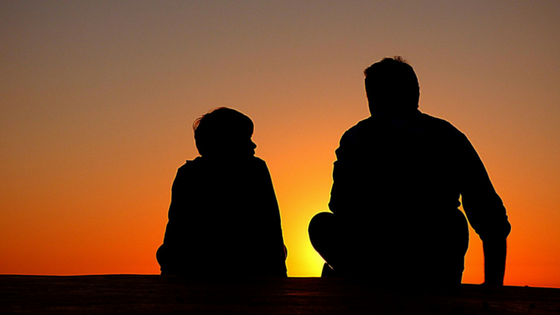
Heartvoice (n): 1. The unvarnished and vulnerable unveiling of a man’s wounds, longings, regrets, victories and defeats. 2. A man’s authentic story.
I never heard my father’s.
My father didn’t either.
Not once having heard his father’s heartvoice, Dad did not know how to listen to his own so never allowed me into the inner chambers of his hurt. Never unveiled his wounds. Deeply buried, he never reached them himself, thus never healed.
“If a man, cautious, hides his limp, somebody has to limp it,” warns Robert Bly in ‘My Father’s Wedding.’
A few years before Dad died, I tried to limp his wounds by reconstructing his past. I urged him to face his demons hoping to make him whole. But I arrived too late. By then, his heart was an impregnable fortress and he left this world haunted by a thousand regrets.
“The strongest man,” I’d tell him, “is the one who has the courage to be vulnerable.”
My plea was always met by a puzzled, fear-tinged glance, a discomfited shuffle, a nervous smile, and a reflexive hardening of his armor.
“There is a big difference between being stoic and being in denial,” I’d prod further. “Stoicism is not about repressing our emotions but forming conscious relationships with them. If we don’t, instead of wisely responding to them, we’ll keep reacting out of the darkness of our unconscious, invariably in negative ways.”
I wanted him, for instance, to go back to the moment of his childhood when his father would take him down to the basement of their house and kick a ball at him with such force it would often bruise.
“Be a man!” the old man would shout.
Or the time when he was about ten years old and excitedly handed his father a note in which he had scribbled his dream of becoming a world explorer only to see it crushed inside his father’s fist and tossed to the floor with a stern injunction to stop talking nonsense. Not receiving a father’s blessing is the gravest wound a boy can suffer.
I wanted him to grant himself permission to hate his father; to allow the rage to burn through so he could finally move to forgiveness. But all my father could do was make excuses for the ogre who’d bruised and crushed him. “I don’t hate my father,” he’d say. “He did what he had to do to make a man out of me.”
For, brother, what are we?
We are the sons of our father,
Whose face we have never seen,
Whose voice we have never heard. — Thomas Wolfe
There is an inevitable moment in every boy’s life when his father slips and falls from his pedestal. When the boy discovers that his father is not a god, but flawed and fallible like everyone else. This usually occurs when the boy himself falls from grace, around the age of ten, or the onset of puberty.
Adolescence: The age when a boy stops quoting his dad and starts criticizing him. — Evan Esar
In ‘East of Eden,’ author John Steinbeck describes such a moment:
“When a child first catches adults out — when it first walks into his grave little head that adults do not have divine intelligence, that their judgments are not always wise, their thinking true, their sentences just — his world falls into panic desolation. Who knows what causes this — a look in the eye, a lie found out, a moment of hesitation? — then gods are fallen, and all safety gone… and the child’s world is never quite whole again.”
For me, that moment came at age nine when I finally mustered the courage to ask my father why he and Mom did not make love anymore. I don’t know how I found out but surely must’ve panicked when realizing their marriage and our family were falling apart. I had discovered the sham in their relationship and felt unsafe. But instead of his heartvoice, he stared me down with a wrathful glare and shouted, “What did you say!?” which made my jaw quiver and my eyes brim with frightened tears. Without another word, he got up from his chair and walked out of the room.
I had pressed hard on one of his festering wounds, but being the kind of man who never takes time to examine his hurt, he wounded me instead — the default reaction of the bully.
As it is, many fathers exact on the hides and hearts of their children the ire of their frustrations, the thunderbolts of their distress, the suffocating anguish of their dispassionate marriages, the festering anger of their unfulfilled desires, and the dull ache of their tedious, apathetic existence.
In that wretched state, what wisdom can a father impart if he hasn’t taken the time to grapple with the thorniest questions of existence, or the courage to journey through the dark and malodorous corridors of his psyche until coming to terms with the angel in himself and the devil in himself. In that state, it would be more benevolent if he met each of his children’s questions with “I don’t know,” rather than playing God twenty-four hours a day.
To be clear, before a boy falls from grace, I believe the father must remain King. The boy needs to be able to look up to him as an ever-protecting, omniscient and almighty god. The father must stand high above the boy, benevolent, of course, but awe inspiring, even evoking respectful fear. This runs contrary to the stance assumed by far too many fathers who lower themselves to the boy’s level and seek to become his “buddy” which must scare the hell out of a boy.
As King, however, the father must prepare himself for that fateful day when he is found out by the boy. When that happens, rather than stony silence, a raging glare or specious answers, the boy needs to hear his father’s unvarnished story. He needs to be shown his father’s wounds, his many mistakes and the way he’s dealt with life’s inevitable hardships and overcame them. The boy doesn’t need all the answers, simply told where he might find them.
Sad is the man who is asked for a story and can’t come up with one. — Li-Young Lee, A Story
I worry greatly about the millions of American boys now being raised without their fathers’ presence and with little guidance, I suspect, from other positive male role models. Denied the voice of their father’s heart, it is up to the male elders to respond to the responsibilities befitting their age and help initiate these boys into good men. This has become my mission at this stage in my life.
“As a man passes through the elders’ gates,” says mythologist Michael Meade, “his focus shifts from personal striving and status building to attending to the mysteries at the core of the community. The losses in life,” Meade adds, “become the cloth of the cloaks of elders.”
The losses to which Meade alludes, are precisely the ones boys hunger to hear once they’re at the threshold of manhood. They want to feel our wounds and watch us limp. If the elders hide this from view, boys will be forced to do the limping for us. They’ll continue making the same mistakes and perpetuating the many problems of our world which can often be traced back to uninitiated men. The cycle will never break and the hurt won’t heal. To wit, seventy percent of all suicides in 2017 were male.
“The way to guarantee that someone will continue wounding others [or themselves]”, say Michael Meade, “is to keep him ignorant of his own wounds.”
It’s not only boys who need to hear the male heartvoice but all men must be courageous and vulnerable enough to listen to their own.
Jeffrey Erkelens is the creator of ‘The Hero in You,’ a book for boys (10–13) meant to guide them toward an evolved expression of manhood and help them develop the character strengths needed to become caring and passionate men of noble purpose. Sign up here to receive updates on the book’s upcoming publication.


